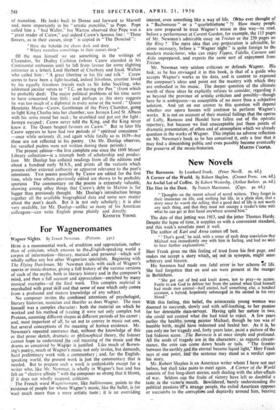For Wagneromanes
Wagner Nights. By Ernest Newman. (Putnam. 3Es.) HERE is a monumental work, of erudition and appreciation, rather than of criticism, which ensures to the•English-speaking world a corpus of information—literary, musical and personal—which will wholly suffice any but other Wagnerian specialists. _Beginning with The Flying Dutchman, Mr. Newman deals with each of Wagner's operas or music-dramas, giving a full history of the various versions of each of the myths, both in literary history and in the composer's mind, and then a full account and appreciation—enriched by many musical examples—of the final work. This complex material is marshalled with great skill and that sense of ease which only comes from a profound and mature knowledge of any subject. No composer invites the combined attentions of psychologist, literary historian, musician and thurifer as does Wagner. The man himself was a complex character: both the material on which he Worked and his method of heating it were not only complex but Protean, assuming different shapes at different periods of his career ; and, most important of all, he set out to convey in music not one, but several conceptions of the meaning of human existence. Mr. Newman's repeated assurance that, without the knowledge of this or that prose sketch, dramatic or philosophical theory, the listener cannot hope to understand the t eal meaning of the music and the drama as conceived by Wainer is justified. Like much of Brown- ing's poetry, much of Wagner's music not only invites, but demands, hard preliniinary work with a commentary ; and, for the English- Speaking world, the. presentwork is just the commentary that is needed. But to prepare such a work is unthinkable except for a writer who, like Mr. Newman, is wholly in Wagner's ban and has felt an " elective affinity " with the composer so strong that it blunts, g it does not wholly suspend, criticism. The French word Wagneromane, like balletomane, points to the 'existence of people for whom Wagner's music, like the ballet, is (or was) much more than a mere artistic taste-; it is an overriding interest, even something like a way of life. (Who ever thought of a " Bachomane " or a " quaftettortiane" ?) How many people are now prepared to treat Wagner's music in this way—to read, before a performance at Covent Garden, for example, the 115 pages of Mr. Newman's admirable essay an Tristan or the 250 pages on the Ring ? The mere idea that any preparation is advisable, let alone necessary, before a " Wagner night " is quite foreign to the modern music-lover, who can enjoy Figaro, Fidello, Carmen and Aida unprepared, and expects the same sort of enjoyment from Tristan.
Mr. Newman very seldom criticises or defends Wagner. His task, as he has envisaged it in this book, is that of a guide who accepts Wagner's works as his data, and is content to expound the composer's ideas and point out the mastery with which they are embodied in his music. The deeper question of the ultimate worth of these ideas he explicitly refuses to consider, regarding it as beyond the province of artistic criticism and possibly—though here he is ambiguous—as susceptible of no more than a subjective solution. And yet on our answer to this question will depend whether our opera houses will continue to perform Wagner's works. It is not on account of their musical failings that the operas of Lully, Rameau and Handel have fallen out of the operatic repertory, but because we find unacceptable just those points of dramatic presentation; of ethos and of atmosphere which we already question in the works of Wagner. This implies no adverse reflection on Mr. Newman's book as he has conceived it, only a fear that it may find a diminishing public and even possibly become eventually
the preserve of the music-historian. MARTIN COOPER.






































 Previous page
Previous page